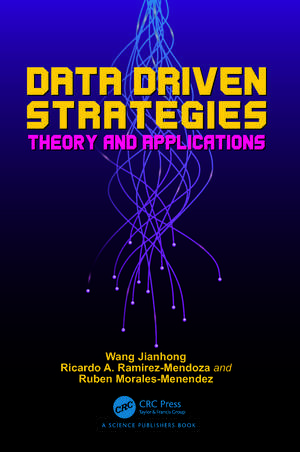Data Driven Strategies: Theory and Applications
Autor Wang Jianhong, Ricardo A. Ramirez-Mendoza, Ruben Morales-Menendezen Limba Engleză Paperback – 7 oct 2024
Preț: 351.16 lei
Preț vechi: 449.33 lei
-22% Nou
Puncte Express: 527
Preț estimativ în valută:
67.20€ • 71.85$ • 56.03£
67.20€ • 71.85$ • 56.03£
Carte tipărită la comandă
Livrare economică 18 aprilie-02 mai
Preluare comenzi: 021 569.72.76
Specificații
ISBN-13: 9780367750084
ISBN-10: 0367750082
Pagini: 362
Ilustrații: 160
Dimensiuni: 156 x 234 mm
Greutate: 0.67 kg
Ediția:1
Editura: Science Press
Colecția CRC Press
ISBN-10: 0367750082
Pagini: 362
Ilustrații: 160
Dimensiuni: 156 x 234 mm
Greutate: 0.67 kg
Ediția:1
Editura: Science Press
Colecția CRC Press
Public țintă
AcademicCuprins
Introduction. Data driven model predictive control. Data driven identification for closed loop system. Data driven model validation for closed loop system. Data driven identification for nonlinear system. Data driven iterative tuning control. Data driven applications. Data driven subspace prediction control. Conclusions and outlook.
Notă biografică
Wang Jianhong received a Ph.D. degree from Nanjing University of Aeronautics and Astronautics, China in 2011. From 2013 to 2015, he was a postdoctoral fellow in Informazione Politecnico di Milano. From 2016 to 2018, he was a professor at the University of Seville. He is currently a professor at Tecnológico de Monterrey. His current research interests include real-time and distributed control, optimization and system identification.
Ricardo A. Ramirez-Mendoza received a Ph.D. degree from INPG, France in 1997. He is now a Professor and dean of Research at Tecnológico de Monterrey. His main research interests include applications of advanced control to automotive sysetms. He is the author of 3 books and more than 100 papers in top journals. He has worked as an expert consulting for different industries and is a certified reviewer for regional development projects.
Ruben Morales-Menendez received his Ph.D. degree from the Tecnológico de Monterrey, Mexico, in 2003. He has been a specialist consultant in the analysis and design of automatic control systems for continuous processes for more than 35 years. He is currently dean of graduate studies, a member of the National System of Researchers of Mexico (Level II), of the Mexican Academy of Sciences and of the Mexico Academy of Engineering.
Ricardo A. Ramirez-Mendoza received a Ph.D. degree from INPG, France in 1997. He is now a Professor and dean of Research at Tecnológico de Monterrey. His main research interests include applications of advanced control to automotive sysetms. He is the author of 3 books and more than 100 papers in top journals. He has worked as an expert consulting for different industries and is a certified reviewer for regional development projects.
Ruben Morales-Menendez received his Ph.D. degree from the Tecnológico de Monterrey, Mexico, in 2003. He has been a specialist consultant in the analysis and design of automatic control systems for continuous processes for more than 35 years. He is currently dean of graduate studies, a member of the National System of Researchers of Mexico (Level II), of the Mexican Academy of Sciences and of the Mexico Academy of Engineering.
Descriere
Finding exciting and efficient ways to integrate data into control theory has been a problem of great interest. As most of the classical contributions in control strategy rely on model description, the issue of finding such a model from measured data, i.e., system identification, has become mature research filed.
